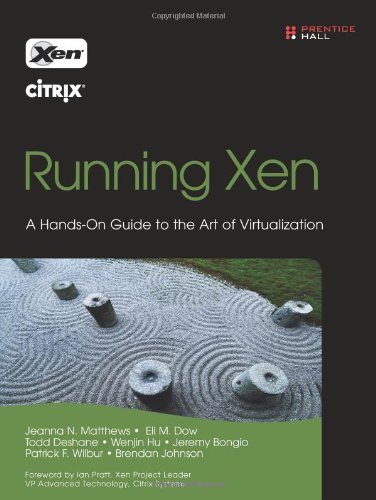

Most ebook files are in PDF format, so you can easily read them using various software such as Foxit Reader or directly on the Google Chrome browser.
Some ebook files are released by publishers in other formats such as .awz, .mobi, .epub, .fb2, etc. You may need to install specific software to read these formats on mobile/PC, such as Calibre.
Please read the tutorial at this link. https://ebooknice.com/page/post?id=faq
We offer FREE conversion to the popular formats you request; however, this may take some time. Therefore, right after payment, please email us, and we will try to provide the service as quickly as possible.
For some exceptional file formats or broken links (if any), please refrain from opening any disputes. Instead, email us first, and we will try to assist within a maximum of 6 hours.
EbookNice Team

Status:
Available4.3
35 reviews
ISBN 10: 0132349663
ISBN 13: 978-0132349666
Author: Jeanna Matthews
1. Chapter 1. Xen-Background and Virtualization Basics
Common Uses and Benefits of Virtualization
Types of Virtualization
Virtualization Heritage
Other Virtualization Systems for Commodity Hardware
Summary
References and Further Reading
2. Chapter 2. A Quick Tour with the Xen LiveCD
Running the LiveCD
Step 1: Downloading the LiveCD Image and Creating the CD
Step 2: Choosing a Domain Image from the GRUB Menu
Step 3: Logging In and the Desktop
Step 4: Creating Guests
Step 5: Deleting a Guest
Step 6: Interacting with Your Guests
Step 7: Testing Your Networking
Too Many Guests
Summary
References and Further Reading
3. Chapter 3. The Xen Hypervisor
Xen Hypervisor
A Privileged Position
Domain0
Xen Boot Options
Choosing an OS for Domain0
xend
XenStore
Summary
References and Further Reading
4. Chapter 4. Hardware Requirements and Installation of Xen Domain0
Xen Domain0 Processor Requirements
Hardware Device Support and Recommendations
Memory Requirements
Choosing and Obtaining a Version of Xen
Methods of Installing Domain0 Hosts
Linux Distributions
XenExpress
Non-Linux Domain Installations
Building from Source
Summary
References and Further Reading
5. Chapter 5. Using Prebuilt Guest Images
Working with Prebuilt Guest Images
Converting Images from Other Virtualization Platforms
Summary
References and Further Reading
6. Chapter 6. Managing Unprivileged Domains
Introduction to the xm Utility
The xm list Subcommand
The xm create Subcommand
Guest Configuration Files
Diagnosing Problems with Guest Creation
Automatically Starting DomUs
Shutting Down Guest Domains
Pausing Domains
Interacting with a Guest Nongraphically
Interacting with a Guest Graphically
Summary
References and Further Reading
7. Chapter 7. Populating Guest Images
Hardware Virtual Machine (HVM) Guest Population
Guest Image Customization
Converting Existing Installations
Summary
References and Further Reading
8. Chapter 8. Storing Guest Images
Logical Volumes
Network Image Storage Options
Guest Image Files
Summary
References and Further Reading
9. Chapter 9. Device Virtualization and Management
Device Virtualization
Backends and Frontends
Granting Control of a PCI Device
Exclusive Device Access Versus Trusted Driver Domains
Device Emulation with QEMU-DM
Future Directions
Summary
References and Further Reading
10. Chapter 10. Network Configuration
Network Virtualization Overview
Designing a Virtual Network Topology
Bridging, Routing, and Network Address Translation
Frontend and Backend Network Drivers and Naming
Overview of Network Configuration in Xen
Details of Bridging Mode
Details of Routing Mode
Details of NAT Mode
Configuring Purely Virtual Network Segments
Assigning MAC Addresses to Virtual Network Interfaces
Assigning IP Addresses
Handling Multiple Network Interfaces in a Domain
vnet-Domain Virtual Network
Summary
References and Further Reading
11. Chapter 11. Securing a Xen System
Structuring Your System for Security
Securing the Privileged Domain
Firewall and Network Monitors
Mandatory Access Control with sHype and Xen Security Modules
DomU Security
Summary
References and Further Reading
12. Chapter 12. Managing Guest Resources
Accessing Information about Guests and the Hypervisor
Allocating Guest Memory
Managing Guest Virtual CPUs
Tuning the Hypervisor Scheduler
Choosing a Guest IO Scheduler
Summary
References and Further Reading
13. Chapter 13. Guest Save, Restore, and Live Migration
Representing the State of a Virtual Machine
Basic Guest Domain Save and Restore
Types of Guest Relocation
Preparing for xm migrate
Experience with xm migrate
Summary
References and Further Reading
14. Chapter 14. An Overview of Xen Enterprise Management Tools
Programmatic Interfaces to the Xen Hypervisor
Citrix XenServer Enterprise, Standard, and XenExpress Editions
Virtual Iron
IBM Virtualization Manager
Enomalism
virt-manager
XenMan
Managing Multiple Systems
Summary
References and Further Reading
15. Appendix A. Resources
Xen Community
XenWiki
Xen Mailing Lists and Bug Reporting
Xen Summits
Xen Source Code
Academic Papers and Conferences
Distribution-Specific Resources
16. Appendix B. The xm Command
17. Appendix C. Xend Configuration Parameter
18. Appendix D. Guest Configuration Parameter
19. Appendix E. Xen Performance Evaluation
Xen Performance Measurements
Performance Isolation in Xen
Performance of Xen Virtual Network and Real Network
Summary
running xen: a hands-on guide
xen guide
running to hades
running xenoblade 2
beginner's guide to running a half marathon
Tags: Jeanna Matthews, Running Xen, A Hands, On Guide, the Art